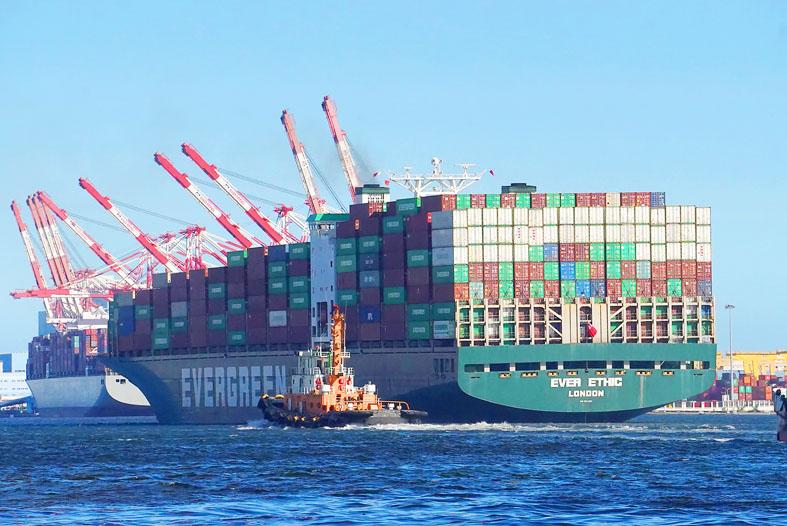Evergreen Marine Corp (長榮海運), the largest container shipping company in Taiwan, reportedly distributed year-end bonuses of as much as 40 months wages to some of its employees yesterday.
Some Evergreen employees have received about NT$2 million (US$72,228) in individual bonuses, local media reports said.
A couple who are entry-level supervisors at Evergreen told the Chinese-language China Times that they received a combined NT$5 million year-end bonus.

Photo: CNA
The two told the newspaper that they earn a base salary of NT$60,000 and that they have been working at the company for more than 10 years.
The shipping giant did not confirm the amount of individual bonuses, but said that each employee was compensated based on performance.
Despite the high-profile grounding of one of its ships in the Suez Canal in March, Evergreen reported net profit of NT$158.27 billion for the first three quarters of this year, an annual increase of 1,347.32 percent, with earnings per share of NT$30.27.
Evergreen’s next-largest peer, Yang Ming Marine Transport Corp (陽明海運), rewarded its employees with up to eight months of salary as year-end bonuses, several media outlets reported yesterday, without disclosing how the information was obtained.
The shipper reported net profit of NT$109.88 billion for the first three quarters, up 5,839 percent from a year earlier. The company’s earnings per share reached NT$32.73, the highest among local peers.
The shipping companies said that the significant revenue growth is a result of rising freight rates amid labor shortages and congestion at ports around the world amid the COVID-19 pandemic.
Shares of Evergreen fell 1.04 percent to NT$142.5, while Yang Ming shares dropped 2.81 percent to NT$121 in Taipei trading yesterday.
Over the whole year, the companies’ stocks increased 253.81 percent and 325.64 percent respectively, Taiwan Stock Exchange data showed.
Additional reporting by Chen Cheng-hui

MULTIFACETED: A task force has analyzed possible scenarios and created responses to assist domestic industries in dealing with US tariffs, the economics minister said The Executive Yuan is tomorrow to announce countermeasures to US President Donald Trump’s planned reciprocal tariffs, although the details of the plan would not be made public until Monday next week, Minister of Economic Affairs J.W. Kuo (郭智輝) said yesterday. The Cabinet established an economic and trade task force in November last year to deal with US trade and tariff related issues, Kuo told reporters outside the legislature in Taipei. The task force has been analyzing and evaluating all kinds of scenarios to identify suitable responses and determine how best to assist domestic industries in managing the effects of Trump’s tariffs, he

TIGHT-LIPPED: UMC said it had no merger plans at the moment, after Nikkei Asia reported that the firm and GlobalFoundries were considering restarting merger talks United Microelectronics Corp (UMC, 聯電), the world’s No. 4 contract chipmaker, yesterday launched a new US$5 billion 12-inch chip factory in Singapore as part of its latest effort to diversify its manufacturing footprint amid growing geopolitical risks. The new factory, adjacent to UMC’s existing Singapore fab in the Pasir Res Wafer Fab Park, is scheduled to enter volume production next year, utilizing mature 22-nanometer and 28-nanometer process technologies, UMC said in a statement. The company plans to invest US$5 billion during the first phase of the new fab, which would have an installed capacity of 30,000 12-inch wafers per month, it said. The

‘SWASTICAR’: Tesla CEO Elon Musk’s close association with Donald Trump has prompted opponents to brand him a ‘Nazi’ and resulted in a dramatic drop in sales Demonstrators descended on Tesla Inc dealerships across the US, and in Europe and Canada on Saturday to protest company chief Elon Musk, who has amassed extraordinary power as a top adviser to US President Donald Trump. Waving signs with messages such as “Musk is stealing our money” and “Reclaim our country,” the protests largely took place peacefully following fiery episodes of vandalism on Tesla vehicles, dealerships and other facilities in recent weeks that US officials have denounced as terrorism. Hundreds rallied on Saturday outside the Tesla dealership in Manhattan. Some blasted Musk, the world’s richest man, while others demanded the shuttering of his

Taiwan’s official purchasing managers’ index (PMI) last month rose 0.2 percentage points to 54.2, in a second consecutive month of expansion, thanks to front-loading demand intended to avoid potential US tariff hikes, the Chung-Hua Institution for Economic Research (CIER, 中華經濟研究院) said yesterday. While short-term demand appeared robust, uncertainties rose due to US President Donald Trump’s unpredictable trade policy, CIER president Lien Hsien-ming (連賢明) told a news conference in Taipei. Taiwan’s economy this year would be characterized by high-level fluctuations and the volatility would be wilder than most expect, Lien said Demand for electronics, particularly semiconductors, continues to benefit from US technology giants’ effort